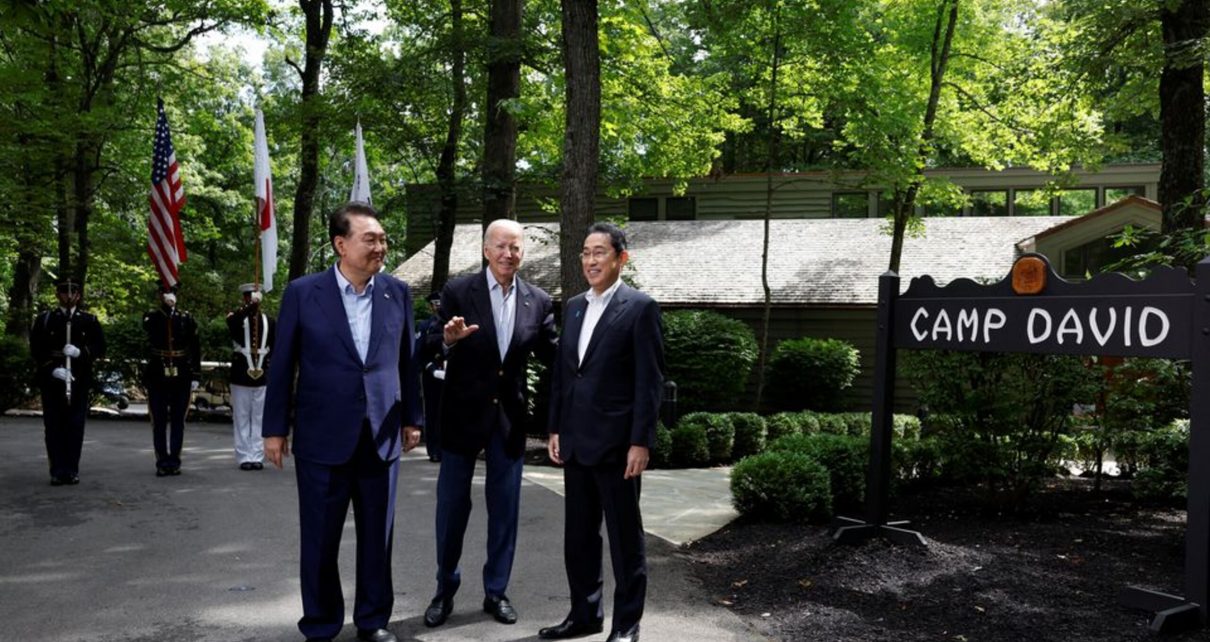U.S. President Joe Biden, alongside South Korean President Yoon Suk Yeol and Japanese Prime Minister Fumio Kishida, unveiled plans to intensify both military and economic cooperation during a summit at Camp David on Friday. The leaders issued a joint and resolute condemnation of China’s “dangerous and aggressive behaviour” in the South China Sea, aiming to showcase a united front against China’s expanding influence and the nuclear threats posed by North Korea.
In their official summit statement, the three nations committed to rapid consultations during crises and to coordinating responses to regional challenges, provocations, and threats that impact shared interests. They also agreed to annual military training exercises and pledged to share real-time information concerning North Korean missile launches by the end of 2023. The leaders further announced their intention to hold trilateral summits on a yearly basis.
Though these political commitments stop short of formalising a three-way alliance, they represent significant strides for Seoul and Tokyo, both of which have historical grievances stemming from Japan’s colonial rule over Korea from 1910 to 1945.
This summit, hosted at the Maryland retreat of Camp David, marked the first standalone meeting between the U.S., Japan, and South Korea. Yoon’s initiative to build a relationship and shared worries about China’s rise and Russia’s recent invasion of Ukraine made it possible.
The leaders’ language concerning China drew particular attention to its strength, and it is likely to evoke a reaction from Beijing, a crucial trading partner for both South Korea and Japan. “Regarding the dangerous and aggressive behaviour supporting unlawful maritime claims that we have recently witnessed by the People’s Republic of China (PRC) in the South China Sea, we strongly oppose any unilateral attempts to change the status quo in the waters of the Indo-Pacific,” the statement declared.
In response, Liu Pengyu, spokesperson for China’s Washington embassy, emphasised the international community’s capacity to discern which party is escalating tensions. He dismissed attempts to form exclusive groupings that could lead to confrontations and military blocs in the Asia-Pacific region, stating that such efforts would not garner support and would instead be met with caution and opposition from regional nations.
This marked Biden’s inaugural Camp David summit for foreign leaders, and he characterised the forested location as a symbol of “new beginnings and new possibilities.” He shared his enthusiasm during a joint press conference with Kishida and Yoon, describing the event as heralding a “new era” for the three countries.
Biden commended the leaders for their political bravery in pursuing reconciliation. He stressed that the world is currently at an inflexion point, requiring new leadership approaches and collaborative efforts. “We have all committed to promptly consulting with one another when any of our countries face threats from any source,” he announced. He elaborated on the establishment of a hotline to facilitate information sharing and coordinated responses during regional crises.
Without directly mentioning China, Kishida acknowledged ongoing unilateral efforts to change the status quo through force in the East and South China Seas. He also emphasised the growing threat that North Korea’s nuclear programme poses.
Yoon underscored that the summit’s agreement would activate a decision-making process within the trilateral framework in response to provocations against any of the three nations. This dynamic, he contended, would enhance their solidarity and resilience.
U.S. officials have cited historical tensions as a factor in why the three countries have not yet pursued a formal mutual defence pact similar to the separate ones between the U.S. and Japan, and the U.S. and South Korea. Kurt Campbell, Biden’s coordinator for Indo-Pacific affairs, emphasised that Yoon and Kishida’s remarkable brand of diplomacy, which occasionally deviated from the advice of their advisors, was what ultimately led to the summit.
China is observing the summit with caution, having previously warned that U.S. efforts to strengthen ties with South Korea and Japan could heighten tensions and confrontation in the region. While the U.S. and its allies aim to avoid provoking China, Beijing perceives Washington’s actions as diplomatic isolation and military encirclement.
Addressing these concerns, Jake Sullivan, Biden’s national security adviser, clarified that the intention was explicitly not to create a NATO equivalent in the Pacific. Additionally, he emphasised that a formal trilateral alliance had not been established as a goal.
The White House seeks to solidify progress between South Korea and Japan, ensuring that it becomes challenging to reverse by embedding routine cooperation across various aspects. Biden, an 80-year-old Democrat seeking another term in the 2024 presidential election, potentially against Republican former President Donald Trump, faces scepticism about the benefits of traditional military and economic alliances.
Given the upcoming elections, South Korea and Japan must navigate the delicate balance of a fragile rapprochement amidst political shifts. Both nations remain cautious in their approach to China and their evolving relationship with each other.



